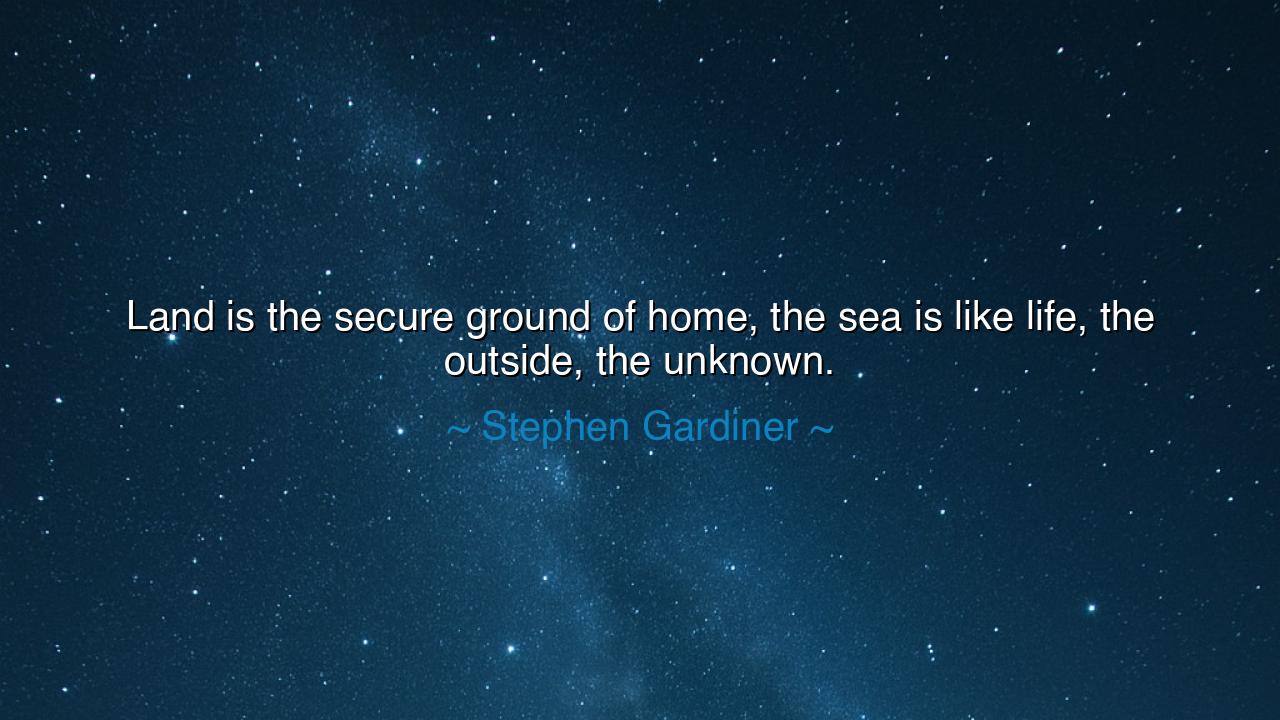
Land is the secure ground of home, the sea is like life, the






The architect and philosopher Stephen Gardiner once said, “Land is the secure ground of home, the sea is like life, the outside, the unknown.” In these words lies a wisdom as old as humanity itself — the eternal tension between security and adventure, between the comfort of what we know and the vast mystery of what lies beyond. The land, Gardiner tells us, is the soil beneath our feet — stable, familiar, nurturing — the place where our stories begin and to which they so often return. The sea, by contrast, is the symbol of the unpredictable — beautiful yet perilous, infinite and unknowable. It calls to the restless soul, inviting it to leave behind certainty and sail into the mystery of existence.
This contrast between land and sea has lived within human hearts since the dawn of time. The ancients spoke of it in their myths: the farmer who stays by his fields and the voyager who chases horizons. The land offers roots; the sea offers freedom. The land shelters and sustains; the sea tests and transforms. In Gardiner’s vision, the land is the dwelling of the heart, while the sea is the proving ground of the soul. One gives us belonging, the other gives us growth. To live fully is to honor both — to know when to plant one’s feet, and when to lift anchor and drift toward the unknown.
The origin of Gardiner’s quote can be traced to his reflections on architecture and humanity’s relationship with space and place. As an architect, he understood that the structures we build on land are not merely physical — they are symbols of stability, identity, and heritage. Yet he also saw that life itself is not static; it moves like the tide, forever in flux. The sea, therefore, represents the forces of change that shape us — the unexpected events, the journeys of discovery, the storms that challenge our endurance. The wise do not curse the sea; they learn to navigate it.
Consider the story of Christopher Columbus, who left the shores of Spain not knowing what awaited beyond the western horizon. For him, the land was safety, and the sea a leap into the unknown. He faced fear, doubt, and tempest, yet without that courage to depart, he would never have found a new world. His journey, though marked by hardship and controversy, mirrors the universal truth of Gardiner’s words: that only by venturing beyond the known do we expand the boundaries of human destiny. The sea — that uncertain vastness — is the forge in which all transformation occurs.
Yet, we must not despise the land, for it is there that life finds meaning. The sea may teach, but the land remembers. After the voyage, the traveler returns home changed, and it is the solid ground that receives him, restores him, and gives his story its ending. The poet Homer captured this eternal rhythm in the tale of Odysseus, whose long voyage across the sea was both an outward adventure and an inward journey. Through trials and temptations, through shipwreck and loss, Odysseus learned that the sea — like life — is full of peril and wonder, but that the land of home gives purpose to the voyage.
Gardiner’s words, then, speak to the human condition itself. We are all creatures of the land — we seek belonging, love, and peace — yet our spirits yearn for the sea, for challenge, for the discovery of who we truly are. The danger lies in clinging too tightly to either. Those who never leave the land grow stagnant; those who live forever at sea lose all sense of rest. The wise soul learns balance — to dwell in safety when needed, and to set sail when called. For life demands both courage and contentment, both adventure and homecoming.
So, my child of earth and tide, remember this: life is both land and sea. Do not fear the unknown, for it is the sea that reveals the depths of your own strength. But neither forget the land, where your roots lie, and where your heart may rest after the storms have passed. Build your foundations firm, but keep your spirit open to the winds of change. For the land without the sea is lifeless — and the sea without the land is endless wandering.
Let your days be like the voyage of the wise mariner — anchored by faith, guided by wonder. When the waves rise and the horizon disappears, trust that every sea eventually leads you home. And when you stand again upon the secure ground of land, look back upon the waters that once frightened you, and give thanks — for it was there, in the unknown, that you found yourself.






AAdministratorAdministrator
Welcome, honored guests. Please leave a comment, we will respond soon